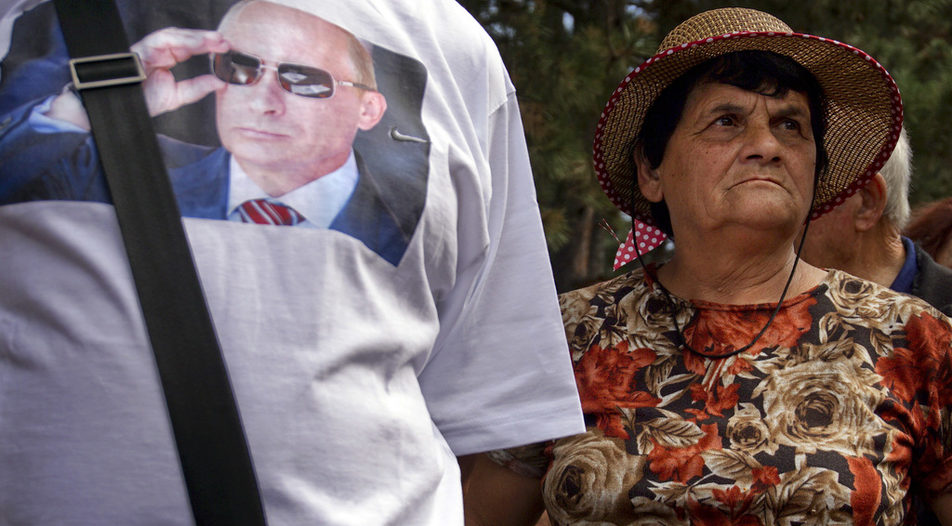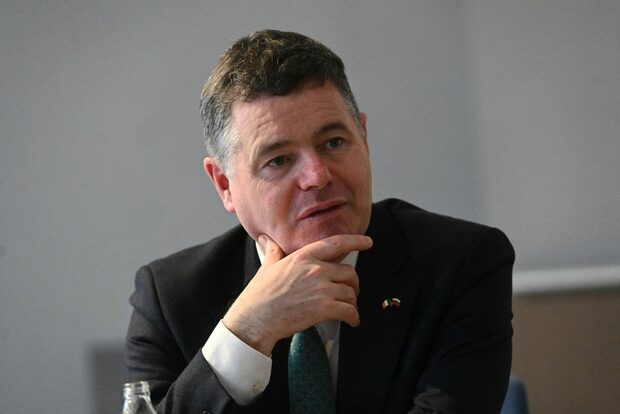Welcome to the latest edition of our weekly overview of what's going on in Sofia and around the country. Not much, it seems these days. Bulgaria is closed for yet another lockdown and most of what you see on TV is pre-election campaigning.
And while tons of known or unknown faces are struggling to board the new parliament, here is a reminder why it is a battle that will pay off. Since 2013, the GDP of Bulgaria grew by 16.7%. Half of that is due to European funding (more on that later on). By far the biggest slice of EU funds has gone towards private investments and workforce capability.
Think about it - almost everything good that has happened in the economy was facilitated by EU money. And who controls the money flow from Brussels? That's right, the government and all its institutions! And who can get in the government? Well, anyone who manages to top a mere 4% of the vote, because the ruling party GERB will look far and wide for coalition partners to stay in power.
And as we know from previous experience, all the smaller coalition partners of GERB usually get their own small gold mines to dig in.
So if you want your cut of almost 30 bln. euro that are due to rain over the Bulgarian economy in the next 7 years, now is the time to claim it - by running for election.
So after we figured out that Brussels is the most important capital in the world for Sofia right now, let's have a look at the previous title holder: Moscow.
POLITICS
Yet another spy story
In a flamboyant move, the prosecution service announced that it had broken down a spy-ring of ex- and present military servicemen, who were handing out secrets to Russia. Shortly afterwards, two more diplomats from the Russian embassy were expelled. While the story is long and complicated (you can read more about it here), some questions still linger.
The Russian exodus...
First of all, why the sudden urge by the authorities to expel Russian diplomats and discover spy connections with Moscow? Bulgaria has always had a cozy connection with the Russian secret services, one that was never really severed even after 1989.The one time someone did something visible was back in 2001 when the then-government of Ivan Kostov expelled three Russian diplomats - as a pre-NATO accession gesture. When a whole group of EU nations took action against Russia in 2018, following the Skripal case in the UK, Sofia kept quiet.
And then suddenly 18 months ago, the exodus began: so far 7 Russian diplomats have been thrown out of the country for "espionage". So something must have changed.
...and the backdoor entry
The only visible change is actually positive for Moscow - the completed construction of "TurkStream" which allows Gazprom to bypass Ukraine and control almost all of Bulgaria's gas entry points. Which makes it kind of funny when Prime Minister Boyko Borissov claims, as he did this week, that Bulgaria is "100% energy independent".
Promises, promises
The approach of elections seems to mean that anyone can claim anything these days. If you want to see how the parties are clamoring to change economic policy, you can read this overview by Martin Dimitrov, Vera Denizova and Ivaylo Stanchev. Many parties promise a huge rise in salaries which is rather surprising in a market economy, but not at all surprising in the least well-paid economy in the EU (here is a useful map on the subject)
COVID-overview
Bulgaria keeps on forging somber records and last week saw the biggest rise in hospitalizations and cases since the beginning of the pandemic. As you probably know by now, the country is closed for yet another lockdown - this time until the 1-st of April. But we never know. Bulgaria hopes for a big new shipment of Pfizer that should be distributed amongst the vaccination-laggards in the EU. If that happens, the country will have over a million new jabs in the next 3 months, which should substantially raise the rate of vaccination.Over 60% of people are ready to be vaccinated, which is also a positive sign (though mostly due to travel requirements).
No votes for you
And to finish this section, here's a number. 120 thousand people are quarantined in the country at present. This is a huge number, given that some of them will stay that way for election day. It is going to be a challenge for the "quarantine ballot boxes" to be delivered to everyone on time and collected. As you can guess already, it is going to be a very messy election.
ECONOMY
Where would we be without EU funds?
In 2020, Bulgaria's GDP was 16.7% higher than in 2013, according to national statistics (link in Bulgarian). Calculations by the Ministry of Finance based on the econometric model SIBILA 2.0 show that half of this increase is due to absorbed EU funds from the second programming period 2014-2020, according to a report posted on the ministry's website in March 2021. With regard to private investments, the difference is over 20%. This is mostly due to the "Human resources" program which sponsors labor-related activities.
The calculations represent an estimate of the direct macroeconomic effects of the European Union's structural funds and the projects financed by them. By the end of 2020, 54.4% of the 9.9 billion euro intended for Bulgaria in the second programming period had been absorbed.
Can you guess the two most endangered sectors in Bulgaria?
According to credit insurer Coface Bulgaria's risk assessment report, in the first quarter of 2021, the insolvency risk in Bulgaria is highest for firms in energy and textiles. This rather strange combination is explained by political factors in the first sector, and by market forces in the second. Energy is highly volatile especially around elections, and people have simply stopped buying textiles during the pandemic.According to Coface analysts, insolvency in Bulgaria is down in January in February 2021 compared to the same period in 2020 because of government aid keeping so-called zombie firms afloat. CEO Plamen Dimitrov says that this will likely change in the second half of the year when the rollout of fiscal stimulus gradually ends.
C-bank revises FDI in 2020 to over 2bn euro
Foreign direct investment in Bulgaria in 2020 exceeded 2.1 billion euro, according to the central bank's latest estimates. The number is about 1.6 billion euro higher than reported a month ago (and quoted here).
This drastic change resulted from a large-scale revision of the balance of payments data, covering the entire period since 2015. The revision is hardly a surprise as the methodology allows for such corrections in March and September.
The revision of FDI is likely due to a change in the way the BTC telecom deal has been accounted for. Until now, the deal was represented through an inflow of about 0.9-1 billion euro, and a similar outflow (making the net effect on FDI close to zero). Now, the outflow is excluded from the accounts, which is a better reflection on reality because the operation is, in fact, a transfer of funds from a foreign company to the (primarily) Bulgarian shareholders.
The first tunnel under the Balkan mountains
Four local consortiums have submitted price offers in the tender procedure for the construction of the tunnels underneath Shipka peak in Stara Planina mountain near Gabrovo, the Road Infrastructure Agency announced. The lowest offered price for the 10.6-km project (of which 7.6 km is new construction) is 358 million levs or 183 million euro with VAT by Hydrostroy and Patni stroeji-Veliko Tarnovo. And they'll probably win despite not having a lot of experience in tunnel construction.
The tunnels - actually five in total, are intended to create a fast connection between Bulgaria's north and south. It is a lengthy undertaking - the contract for its extended conceptual design was signed in 2014 but construction is expected to finish, optimistically, in 2025.
The auctions keep coming
On March 22, the Ministry of Finance sold 5-year zero-interest securities worth 300 million levs (150 million euro) on the domestic market. The achieved yield was -0.1%. In February - the last time the state offered securities from the 5-year segment, the achieved yield was -0.17%. As a whole, since the beginning of 2021, the state has raised 800 million levs or 400 million euro from T-bonds.
BUSINESS
Software
AcronisAcronis Bulgaria is planning to move its Sofia office to occupy three floors in the new NV Tower due to the rapid growth and growing number of employees. The company is the local branch of international software firm Acronis which focuses on cybersecurity. The nineteen-storey building on GM Dimitrov Blvd. is in an advanced stage of construction. It is expected to be commissioned before the middle of this year.
Fuel
Bulmarket DMBulmarket DM is planning to make a new product for biodiesel from cashew shells. The fuel trader, whose group includes the country's largest biofuel producer, Astra Bioplant, will make a new product through the affiliated company LNG Systems which bought the facilities of the bankrupt firm Polisan in Ruse. There, the company will distill cashew shell oils, and the resulting product will be sold for processing to second-generation biodiesel. The company is waiting for final confirmation from two foreign clients to start production in the second half of the year.
Technology
BulprosThe largest entirely Bulgarian software company by revenue in the country, Bulpros (86.4 million levs in 2019), is merging with its German partner - consulting firm ec4u. The newly formed group will be majority-owned by the pan-European Silverfleet Capital Fund. Meanwhile, the Bulgarian funds BlackPeak Capital and NEVEQ, which joined Bulpros in 2015 and 2016, respectively, are withdrawing from their investments. They held a 22% stake in the company
ENERGY
A huge spike in the gas price
The price of natural gas will likely increase by 13% from April 1 to just over 32 levs per MWh - the highest value in over a year, according to calculations by the Energy and Water Regulatory Commission. The increase is hardly a surprise as gas prices on international markets rose by 20% in March. The commission's estimates will be discussed at a meeting on March 25. Consequently, inflation is also likely to go up
WATCH OUT FOR
People
Ilhan KYUCHYUK
the Bulgarian member of the European parliament from the MRF party has been officially banned from entering China last week because of his (worthy) position on the Uighur minority case
Location
Obzor
the newest municipality in Bulgaria, after its citizens voted to separate from the wealthy nearby resort of Nesebar because they don't feel cared for enough.
WORD OF THE WEEK
Позор
Literally - disgrace. The feeling you get when the Bulgarian national football team plays these days. Also the most used word in headlines after games like the one against Switzerland this week. Expect a lot of "pozor" after the game versus Italy.
Welcome to the latest edition of our weekly overview of what's going on in Sofia and around the country. Not much, it seems these days. Bulgaria is closed for yet another lockdown and most of what you see on TV is pre-election campaigning.
And while tons of known or unknown faces are struggling to board the new parliament, here is a reminder why it is a battle that will pay off. Since 2013, the GDP of Bulgaria grew by 16.7%. Half of that is due to European funding (more on that later on). By far the biggest slice of EU funds has gone towards private investments and workforce capability.












